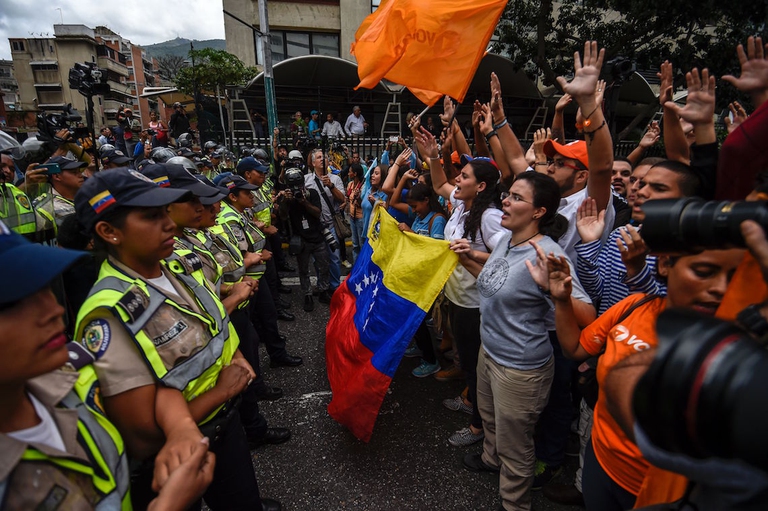
A federal court in Washington, D.C. has struck down the Dakota Access Pipeline, following years of campaigning by the Standing Rock Sioux tribe.
The socio-economic crisis in Venezuela A key source of the crisis is the diminishing price of oil, which was selling at 97 dollars per barrel in 2013, but fell to 48 dollars per barrel by 2015. This has hit the country harshly as crude oil exports are a central pillar of the Venezuelan state-led economy, with this commodity making up 97.7 per
A key source of the crisis is the diminishing price of oil, which was selling at 97 dollars per barrel in 2013, but fell to 48 dollars per barrel by 2015. This has hit the country harshly as crude oil exports are a central pillar of the Venezuelan state-led economy, with this commodity making up 97.7 per cent of merchandise exports from Venezuela in 2013.
This reduction in the price of oil has resulted in hyperinflation and economic deterioration in Venezuela, compounded by rising levels of crime. Caracas has now been listed as the second most violent city in the world.
The economic crisis has meant the government has been less able to support social welfare programs, and food and medicine shortages have hit the nation. Shelves in shops are empty and people queue in long lines for basic goods. To counter this the government has enacted food rationing and an estimated 35,000 Venezuelans crossed the border to Colombia in order to buy basic goods when it was briefly re-opened by President Nicolás Maduro on the 10th of July.
Currently Maduro, who succeeded Hugo Chavez following his death and was elected to a six-year term, has put all the blame on falling oil prices and an economic war being conducted by the country’s rivals, such as the United States. Yet his critics have blamed failed socialist economic policies for Venezuela’s recession, triple digit inflation and lack of products in shops.
With the current situation, opposition to Maduro has been mounting with the opposition coalition Democratic Unity Roundtable (MUD) winning 99 of 167 seats compared to Maduro’s United Socialist Party of Venezuela (PSUV) that won 46 seats in the legislative elections held in December 2015.
Furthermore, the opposition has been successful in overcoming the first hurdle to enacting a presidential recall referendum by gathering over 200,000 signatures in a petition, according to the National Electoral Council of Venezuela. These are enough to set off the process of calling a referendum that would ask the electorate whether they want Maduro to continue to govern. Protests have also broken out. Protester Rueben Merenfield, a 58-year old hardware seller, stated, “we’re tired of standing in lines, tired of skipping meals”, and that “we want the referendum promised by the constitution”.
This has led Maduro to state that if a recall referendum occurs and is legal he will accept the people’s decision.
Political and economic instability shows that a change needs to occur, in terms of the economic structuring of the state or its political leadership. Furthermore, the current situation in Venezuela provides a stark warning for nations that rely heavily on the revenue from natural resources that are subject to volatile price fluctuations.
Siamo anche su WhatsApp. Segui il canale ufficiale LifeGate per restare aggiornata, aggiornato sulle ultime notizie e sulle nostre attività.
![]()
Quest'opera è distribuita con Licenza Creative Commons Attribuzione - Non commerciale - Non opere derivate 4.0 Internazionale.
A federal court in Washington, D.C. has struck down the Dakota Access Pipeline, following years of campaigning by the Standing Rock Sioux tribe.
Thirty years ago, Bill McKibben alerted us to the threat of climate change. In 1989 he published his groundbreaking book, The End of Nature, which was considered the first book on climate change for the general audience. Today, he broadens his warning. Humans have now emerged as a “destructive geological force”, he writes in his
L’8 giugno si tengono le elezioni in Regno Unito per scegliere chi guiderà il paese nei negoziati per la Brexit. Theresa May è favorita, ma il suo vantaggio è in calo.
The Canadian oil company Pacific E&P, who had been granted the right to explore and extract oil in the Peruvian Amazon by the national government, has halted its exploration activities in block 135 of the rainforest (which is divided into “blocks” of oil and gas exploration). The company released a statement saying it “has made the decision to relinquish its exploration
The Bakken or Dakota Access Pipeline (DAPL), an underground oil pipeline project in the United States, is owned by a network of oil and pipeline companies, joint ventures and holding companies. After Trump revived it in January without the consent of the Sioux indigenous tribe affected by it and flouting environmental laws, many investors both from the US
Abortion, torture, pipelines, trade agreements, LGBT rights and the US-Mexico border wall. What happened during Trump’s first week leading the United States.
Canadian Prime Minister Justin Trudeau has approved the building of a major oil pipeline known as the Kinder Morgan pipeline, which will run from the Alberta Tar Sands to the port of Burnaby on the province of British Columbia’s (BC) Pacific coast, whilst rejecting the construction of its twin, the Northern Gateway pipeline. The Kinder
Riconosciuti i rischi ambientali del progetto Dakota access pipeline. Una vittoria per i sioux e tutti gli nativi americani. Ma la lotta potrebbe non essere finita.
It has been four years since the Inter-American Court of Human Rights found Ecuador guilty of granting the ancestral land of the Sarayaku in concession to an oil and gas company. The community of about 1,200 indigenous Kichwa people is situated along the Bobonaza River, in the southern part of the Ecuadorian Amazon. In 2012, the Court reaffirmed the right of










